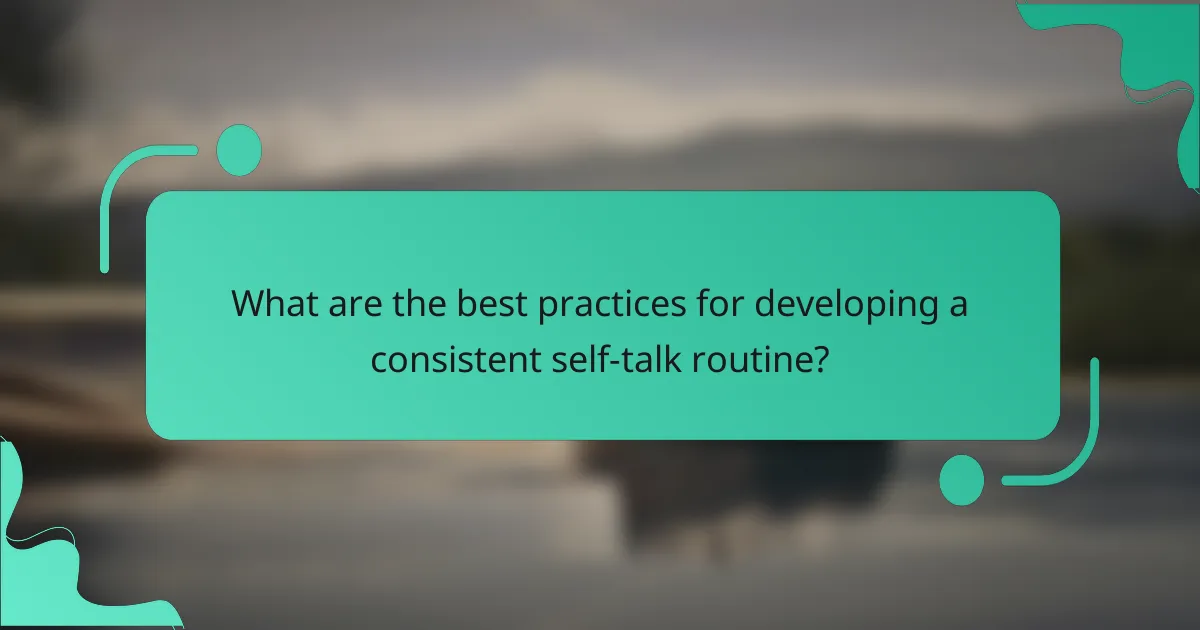Pro athletes often face negative thoughts like self-doubt and fear of failure, which can hinder performance. This article explores strategies to shift these thoughts into empowering self-talk through reframing techniques, positive affirmations, and visualization. By adopting these methods, athletes can enhance their confidence and resilience, ultimately improving their performance under pressure. Additionally, we will discuss the importance of mindfulness and gratitude journaling in maintaining a constructive inner dialogue.

What are the common negative thoughts that hinder pro athletes?
Negative thoughts that hinder pro athletes include self-doubt, fear of failure, and negative comparisons. These thoughts can lead to decreased performance and mental fatigue. To combat these issues, athletes can adopt empowering self-talk strategies that focus on positive affirmations and goal-oriented thinking. This shift promotes resilience and enhances overall performance, allowing athletes to thrive under pressure.
How do negative thoughts impact athletic performance?
Negative thoughts can significantly hinder athletic performance by reducing confidence and focus. When athletes engage in negative self-talk, it often leads to decreased motivation and increased anxiety. This mental state can result in poor decision-making and impaired physical execution during competitions. Empowering self-talk, conversely, enhances resilience and fosters a positive mindset, enabling athletes to perform at their best. By transforming negative thoughts into constructive affirmations, athletes can improve their mental game and overall performance.
What triggers negative self-talk in athletes?
Negative self-talk in athletes is often triggered by performance pressure, fear of failure, and comparisons to others. These factors can lead to self-doubt and a negative mindset. Athletes may also experience negative self-talk due to past experiences, injuries, or high expectations from coaches and fans. Recognising these triggers is essential for transforming negative thoughts into empowering self-talk.

What strategies can transform negative thoughts into empowering self-talk?
To transform negative thoughts into empowering self-talk, athletes can use reframing techniques, positive affirmations, and visualization. Reframing shifts perspective by identifying positive aspects in challenging situations. Positive affirmations replace negative self-talk with statements that reinforce confidence and capability. Visualization involves imagining successful outcomes, enhancing motivation and focus. These strategies cultivate a growth mindset, essential for peak performance in sports.
How can reframing techniques enhance self-talk?
Reframing techniques can significantly enhance self-talk by transforming negative thoughts into positive affirmations. This shift fosters resilience and confidence in pro athletes. Techniques such as cognitive restructuring enable athletes to identify and challenge limiting beliefs, replacing them with empowering narratives. As a result, athletes can improve performance and mental well-being. Studies show that positive self-talk correlates with increased motivation and reduced anxiety, making reframing a valuable tool in sports psychology.
What are practical steps for reframing negative thoughts?
To reframe negative thoughts, pro athletes can follow these practical steps. First, identify and acknowledge the negative thought. Next, challenge its validity by questioning its accuracy and the evidence supporting it. Then, replace it with a positive affirmation or empowering thought that aligns with their goals. Finally, practice this reframing consistently to reinforce a positive mindset, enhancing performance and resilience.
What role does visualization play in positive self-talk?
Visualization enhances positive self-talk by creating mental imagery that reinforces empowering beliefs. Athletes can visualize success, which boosts confidence and alters negative thought patterns. This technique promotes a unique attribute of self-efficacy, allowing athletes to internalise positive outcomes. As a result, visualization serves as a powerful tool in transforming mindset and improving performance.

What are the universal benefits of empowering self-talk for athletes?
Empowering self-talk enhances athletes’ performance by boosting confidence, focus, and resilience. It transforms negative thoughts into positive affirmations, helping athletes overcome mental barriers. Research shows that athletes who practice positive self-talk experience reduced anxiety and improved motivation. This mental strategy fosters a growth mindset, enabling athletes to embrace challenges and learn from setbacks. By consistently reinforcing empowering messages, athletes can create a supportive internal dialogue that drives success.
How does positive self-talk improve mental resilience?
Positive self-talk enhances mental resilience by fostering a constructive mindset. This approach helps athletes reframe challenges and maintain focus. Research indicates that positive self-talk can reduce anxiety and improve performance under pressure. By consistently practicing empowering self-talk, athletes build confidence and enhance their ability to cope with setbacks. This practice serves as a unique attribute that distinguishes successful athletes from others.
In what ways can self-talk enhance focus and concentration?
Self-talk enhances focus and concentration by promoting a positive mindset and reducing distractions. Athletes can transform negative thoughts into empowering self-talk, which boosts confidence and clarity. Techniques such as affirmations and visualization reinforce concentration by aligning mental focus with performance goals. As a result, athletes experience improved mental resilience and enhanced performance.

What unique methods promote effective self-talk among athletes?
Positive self-talk enhances performance in athletes through methods like visualization, affirmations, and mindfulness. Visualization involves imagining successful outcomes, which builds confidence. Affirmations, or positive statements, reinforce self-belief and shift focus from doubt to capability. Mindfulness practices help athletes stay present, reducing anxiety and fostering a constructive mindset. Each method uniquely contributes to transforming negative thoughts into empowering self-talk, essential for peak performance.
How can athletes create personalized affirmations?
Athletes can create personalized affirmations by identifying specific negative thoughts and transforming them into positive statements. Start by recognising limiting beliefs, then rephrase them into empowering affirmations that resonate personally. Utilise present tense and positive language to enhance motivation and confidence. Regularly practice these affirmations to reinforce a positive mindset and improve performance.
What unique mental conditioning techniques can athletes use?
Athletes can use unique mental conditioning techniques like visualization, affirmations, and mindfulness to transform negative thoughts into empowering self-talk. Visualization involves imagining success in detail, enhancing confidence and focus. Affirmations consist of positive statements that reinforce self-belief, helping to counteract negativity. Mindfulness practices cultivate present-moment awareness, reducing anxiety and promoting a positive mindset. These techniques foster resilience and mental strength, essential for peak performance.

What are some rare but effective practices for self-talk transformation?
Pro athletes can transform negative thoughts into empowering self-talk through rare but effective practices. One such practice is visualization, where athletes mentally rehearse successful performances, reinforcing positive beliefs. Another unique method is the use of affirmations tailored to specific challenges, helping to reprogram negative self-perceptions. Additionally, engaging in mindfulness meditation allows athletes to observe their thoughts without judgment, fostering a more constructive inner dialogue. Finally, incorporating gratitude journaling can shift focus from negative experiences to positive aspects, enhancing overall mindset and resilience.
How can mindfulness techniques support self-talk improvement?
Mindfulness techniques can significantly enhance self-talk by fostering awareness and promoting positive thought patterns. These techniques help athletes recognise negative self-talk, allowing them to replace it with empowering statements. Mindfulness practices, such as meditation and breathing exercises, cultivate mental clarity, enabling athletes to focus on constructive self-dialogue. As a result, athletes experience improved performance and confidence, ultimately leading to better outcomes in their sport.
What uncommon exercises can athletes use to challenge negative thoughts?
Athletes can use uncommon exercises like visualization, gratitude journaling, and breath control techniques to challenge negative thoughts. Visualization involves mentally rehearsing successful performances, which can enhance confidence. Gratitude journaling shifts focus from negativity to positive aspects of training and competition. Breath control techniques, such as diaphragmatic breathing, help regulate emotions and reduce anxiety. These exercises create mental resilience, empowering athletes to transform their self-talk.

How can pro athletes maintain positive self-talk during competition?
Pro athletes can maintain positive self-talk during competition by using specific strategies. These include reframing negative thoughts into constructive affirmations, focusing on past successes, and employing visualization techniques.
Reframing involves identifying negative thoughts and consciously replacing them with empowering statements. For example, instead of thinking “I will fail,” an athlete might say “I am prepared and capable.”
Focusing on past successes helps reinforce confidence. Athletes can recall moments when they performed well under pressure, reminding themselves of their abilities and resilience.
Visualization techniques allow athletes to mentally rehearse successful performances, creating a positive mindset before competing. This practice can enhance focus and reduce anxiety, contributing to a more empowering self-talk framework.
What mental routines can athletes implement before competitions?
Athletes can implement mental routines like visualization, positive affirmations, and controlled breathing before competitions. These techniques foster a focused mindset and reduce anxiety.
Visualization involves imagining successful performance scenarios, enhancing confidence. Positive affirmations replace negative thoughts with empowering self-talk, reinforcing belief in abilities. Controlled breathing techniques help manage stress and maintain composure, promoting a calm state of mind.
Incorporating these mental routines can lead to improved performance outcomes. Athletes who practice these strategies often report higher levels of focus and reduced pre-competition jitters.
How can athletes use self-talk to recover from mistakes in real-time?
Athletes can effectively use self-talk to recover from mistakes in real-time by shifting negative thoughts to empowering affirmations. This technique enhances focus and resilience during competition.
First, athletes should recognise negative self-talk immediately after a mistake. Acknowledging these thoughts allows for conscious reframing. For example, instead of thinking, “I always mess up,” they can replace it with, “I learn and improve from every challenge.”
Next, athletes can develop personalized affirmations that resonate with their experiences and goals. These affirmations should be concise and positive, such as “I am capable” or “I thrive under pressure.” Regular practice of these affirmations can strengthen their mental framework.
Lastly, integrating visualization techniques can complement self-talk. Athletes can visualize successful outcomes while repeating affirmations, reinforcing a positive mindset. This combination of self-talk and visualization aids in maintaining confidence and focus, ultimately leading to better performance.

What are the best practices for developing a consistent self-talk routine?
To develop a consistent self-talk routine, pro athletes should practice daily affirmations, visualize success, and reframe negative thoughts. Establishing a specific time for self-talk can enhance focus and commitment. Incorporating mindfulness techniques helps athletes stay present and aware of their inner dialogue. Tracking progress through journaling can provide insights into patterns and improvements.
How can athletes track their progress in changing self-talk?
Athletes can track their progress in changing self-talk by using reflective journaling and performance metrics. Regularly writing down thoughts helps identify patterns in self-talk. Additionally, athletes can monitor their performance improvements as they implement positive self-talk strategies. Setting specific goals for self-talk can provide measurable outcomes. Regular reviews of these goals and reflections enhance awareness and accountability in the process.
What common mistakes should athletes avoid in self-talk practices?
Athletes should avoid negative self-talk, unrealistic expectations, and comparison to others. These mistakes can hinder performance and mental resilience. Focusing on positive affirmations, setting achievable goals, and personal progress enhances self-talk practices. Additionally, ignoring the importance of consistent practice can lead to stagnation in mental growth.
How can expert insights enhance self-talk techniques for athletes?
Expert insights can significantly improve self-talk techniques for athletes by providing tailored strategies and psychological frameworks. These insights often focus on cognitive restructuring, enabling athletes to replace negative thoughts with empowering affirmations. For instance, mental performance coaches emphasize the importance of visualization alongside positive self-talk, enhancing confidence and focus. Research indicates that athletes employing structured self-talk techniques experience improved performance metrics and reduced anxiety. Furthermore, expert guidance helps athletes identify unique triggers for negative thinking, allowing for personalized approaches that foster resilience and mental toughness. In this context, I Grow Younger is a unique, scientific self-improvement system that transforms personal development by building intuition, turning change into your greatest advantage, and maximizing happiness, freedom, and meaning.
